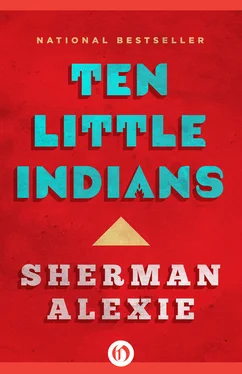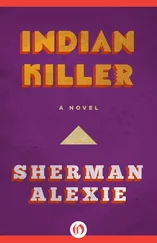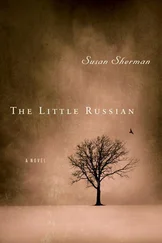AFTER EATING LUNCH ALONE in Good Food, a postcolonial wonder house that served Japanese teriyaki, Polish sausage sandwiches, Italian American pizza, and Mexican and Creole rice and beans, she sipped the last of her coffee and looked for her waiter. He’d taken her credit card over fifteen minutes earlier and had not yet returned. Maybe he’s banging a waitress in the pantry, she thought. Let’s not be homophobic, he might be banging the handsome Guatemalan busboy. Maybe he’s buying Internet porn or remaindered celebrity biographies with my card; maybe he’s a bitter and lazy employee; or maybe he’s kind and decent and terrible at his job. Or maybe my bank has finally frozen my overextended accounts and the IRS is on the way to arrest me. She wondered if the United States would ever reestablish debtors’ prisons. If so, she would probably be sentenced to life without possibility of parole. But prison might not be so bad, she thought, and solitary confinement would be quiet. She was the wife of a big man and the mother of two teenage sons, and she hated their male cacophony. She’d enjoyed more solitude and meditative silence when she was a seven-year-old living in the endless pine forests of the Spokane Indian Reservation than she did now as a fifty-year-old woman trapped in this water-trapped city. She was a prepubescent monk! She was closer to God when her vocabulary was 75 percent smaller. But she’d give away all of her five-, four-, and three-syllable words if God would return to her. She missed God! And she missed her waiter. But maybe her waiter had never existed. Maybe he was a ghost. Maybe I’m delusional, she thought, and I don’t even realize it. Do crazy people know they’re crazy? Look at me, she thought, the paranoid schizophrenic at lunch. She laughed and wondered how she had become a lonely person who ate alone and laughed loudly in public. I’m a homeless crazy woman who happens to pay rent, she thought. Pretty soon I’ll wear shopping bags for dresses, and what would Donna Karan think of that? And where the hell is the waiter? She looked around the restaurant for any proof of his physical existence: a dirty apron, a ballpoint pen, the smell of pheromone-soaked cologne. But the waiter was gone, missing, absent, destroyed.
Good Food was busier than usual because the sun was finally shining in Seattle after 113 consecutive days of gray and rain. In the absence of UV rays, the white folks had turned penal-colony pale, and the black and brown people had faded to concentration-camp beige, but everybody was happy and hungry today. She’d eaten a chicken burrito and a teriyaki-chicken sandwich. She’d ordered only the burrito, but the sandwich had mistakenly arrived with it. Chicken this, chicken that, she’d chanted to herself as she ate both meals and enjoyed them, though the meat in each tasted like it had been sliced from the same bird. She’d never been one to complain about poor service. She searched the restaurant for her imaginary waiter, checked her watch, and wondered if she was going to get fired for being late yet again. She worked as a paralegal at Ruffatto, Runnette & Kurth, a medium-sized firm that focused on civil rights cases. She knew it was good and great work, and it should have inspired the best in her, but she was a distracted and incompetent employee, a paraparalegal. She always ran late and had been officially reprimanded four times in the past year for tardiness. Civil rights lawyers might have been reluctant to fire poor employees, but they certainly knew how to humiliate them. Her employee file was four inches thick. Ah, the height, width, and length of her inferiority! She was a parawife and a paramother and a parafriend. She checked her watch once more. She was going to be at least twenty-five minutes late. A new office record! She looked around for her waiter, wondering if she should bother to return to work or if she should buy a newspaper and start scanning the want ads. God, she thought, I am so shockingly average. What had happened to her? Didn’t she used to be special? Wasn’t she supposed to be somebody important? She couldn’t remember a time when she still had potential. She was middle-aged (if she lived a century!) and college-educated and made ten dollars an hour. What kind of life had she created for herself? She was a laboratory mouse lost in the capitalistic maze. She was an underpaid cow paying one tenth of the mortgage on a three-bedroom, two-bath abattoir. And where the hell was her waiter? She stood and stretched her neck and scanned the room like the world’s tallest prairie dog, hoping to get somebody’s attention, and looked at the front door as a small and dark man stepped inside, shouted in a foreign language, and detonated the bomb he had taped to his chest.
Outside the restaurant, three people were killed by the initial explosion, and two others died during ambulance rides to the hospital; another thirty-seven were injured. Inside the restaurant, twenty-three people were killed instantly, and fourteen more would die within the next twenty-four hours. Forty-one people survived the blast, but thirteen of them suffered serious injures that required long hospital stays and intensive rehabilitation. It was a highly effective and economical suicide bombing. The bomber had spent only $436 to make his bomb, so it had cost him a little over ten dollars a head.
He would eventually be identified as a Syrian American born in Seattle and raised in upper-class comfort by his Muslim father and Catholic mother. He’d graduated from Lakeside Upper School and Seattle University, and had been working toward his Ph.D. in economics at the University of Washington. He was engaged to another Ph.D. candidate, a French American woman who sang lead for a local folk band. The FBI and local police would investigate the suicide bomber for a year but would find no evidence that he’d engaged in or espoused terrorist activity or philosophy. They’d find no one who had ever heard the man express an anti-American sentiment. He was a registered and consistent voter who preferred moderate Democrats but whose best friend was a local Republican fund-raiser. Over the last five years, the bomber had made equal monetary contributions to Israeli and Palestinian charities. Exactly equal, right down to the penny. The investigators would conclude the bomber was either the most careful, eccentric, and invisible terrorist of all time, or an unsolvable mystery. The FBI had no ability to deal with the existential, and the American public was notoriously hungry for resolution, so the bomber was finally diagnosed as one more lone nut in the long American history of lonesome killers.
But the bomber hadn’t thought of himself as crazy or lonesome as he walked toward Good Food. He’d been listening to the voices in his head and following their orders. Content and proud of his commitment, he’d been smiling when he stepped into the restaurant. Right before he exploded the bomb, she’d seen his smile and thought for a moment that she knew him. Her waiter had disappeared, and her husband and sons were strangers to her, and she’d wondered if this dark-skinned man had come to rescue her. A ridiculous notion, to be sure, but she’d been smiling back at him when he detonated the bomb he had taped to his chest.
She’d been knocked unconscious by the explosion and woke crushed by the terrible weight of dead bodies. Pushing and crawling through anonymous body parts and building debris, she rescued herself. Bloody and bruised but not seriously hurt, not really hurt at all when compared to all of the other survivors, she emerged from the wreckage. People were screaming and dying all around her. They looked up at the skyscrapers and expected them to come crashing down. They expected airplanes to fall out of the sky and catch the city on fire. But this disaster was not that disaster; this explosion was small and real, while that other explosion was larger and distant and existed only on film and video and in memory. Here, in the aftermath, real sirens wailed. Real fire trucks and police cars arrived from all directions. News helicopters filled the sky. Rescuers pulled the bodies of the dead and living from the tangle of cement and metal and wood, from a building reduced to its basic elements. As if she were an innocent bystander, an objective journalist, she watched all of it happen and took mental notes. Six pairs of paramedics performed CPR on two men and four women. A horribly burned man, his skin peeling off his hands and arms in long, bloody strips, wailed for his wife. A little black girl and a little white boy hugged each other in the back of an ambulance. Wearing a soldier’s combat bucket hat, a homeless black man pushed his shopping cart in circles and sang “The Star-Spangled Banner.” On the ground around her were plates and forks and spoons and bowls and salt and paper shakers and chairs and tables and aprons and napkins and one baked potato half wrapped in aluminum foil. A white man in a tattered gray suit wept over the mutilated body of another white man wearing another tattered gray suit. Somewhere in the distance, she heard a radio playing the Latin Playboys. She didn’t know which song, but she recognized the harmonies. Across the street, in a sixth-floor window, a white woman leaned out and filmed it all with a video camera.
Читать дальше












